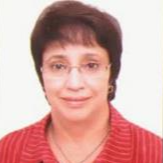
Fatiha Kaddari
Work place: Faculty of Sciences Dhar El Mahraz, University Sidi Mohammed Ben Abdellah, Fez, Morocco
E-mail: kaddari@yahoo.fr
Website:
Research Interests: Computational Game Theory
Biography
Fatiha Kaddari received her PhD degree in chemistry in 1997 from the Montpellier II University in France. In 2005, she received her second PhD degree in didactics of sciences. Her research interests in education include ICT integration in science and serious games
Author Articles
Visual Block-based Programming for ICT Training of Prospective Teachers in Morocco
By Ibrahim Ouahbi Hassane Darhmaoui Fatiha Kaddari
DOI: https://doi.org/10.5815/ijmecs.2022.01.05, Pub. Date: 8 Feb. 2022
We conducted a training experimentation on computer coding whose aim is to probe ICT skills enhancement of pre-service teachers in Morocco. For that, we have developed and implemented training sessions using a visual programming tool (Scratch) targeting 63 prospective teachers at the Faculty of Educational Sciences (FSE) and the Regional Center for Education and Training Professions (CRMEF) in Nador, Morocco. During these sessions, trainees were introduced to algorithmic thinking where they implemented teaching sequences in their specialty subjects using Scratch. Pre and post surveys were conducted to measure the evolution of the trainees’ perceptions towards the integration of computer coding in the teaching and learning of their specialties. The analysis of the surveys showed the potential of integrating computer coding in the development of learners’ transversal skills. The training revealed different possibilities of exploiting visual block-based programming environments in the teaching and learning process.
[...] Read more.Enhancing Math-class Experience throughout Digital Game-based Learning, the case of Moroccan Elementary Public Schools
By Tariq Bouzid Fatiha Kaddari Hassane Darhmaoui El Ghazi Bouzid
DOI: https://doi.org/10.5815/ijmecs.2021.05.01, Pub. Date: 8 Oct. 2021
There is a growing interest in integrating active learning and computer-based approaches in the teaching and learning of mathematics in elementary schools. In this study, we introduce Digital Game-Based Learning (DGBL) of Mathematics targeting students in the 5th and 6th grades following a design-to-implementation strategy. We first developed an edutainment Mathematics game and then tested it with 196 pupils from 9 public elementary schools in Morocco. The rationale of the study is to probe the effect of DGBL in lessening pupils’ mathematical anxiety and improving classroom experience.
Students in our study were more engaged and less anxious towards learning Mathematics. Our designed pedagogical edutainment game made students more comfortable when dealing with numerical arithmetic assignments. The study suggests that edutainment games lead to positive individual attitudes towards mathematics and to a better math classroom experience, thus more effective teaching and learning of mathematics.
Gamification Approach in Teaching Web Programming Courses in PHP: Use of KAHOOT Application
By Ibrahim Ouahbi Hassane Darhmaoui Fatiha Kaddari
DOI: https://doi.org/10.5815/ijmecs.2021.02.04, Pub. Date: 8 Apr. 2021
Learning algorithmics and programming fundamental courses is widely considered to be quite challenging in the field of computer science. Gamification is a good alternative educational practice to promote programming teaching, it allows better engagement of students in their learning. Students acquire a reasonable level of abstraction and logic and develop reflections on various course concepts. They are better introduced to critical programming situations. In the present work, we investigated the impact of introducing simple gamified educational sequences within a dynamic programming PHP course on first year Master students in Educational Technology and Pedagogical Engineering (TEIP). Our use of gamification learning sequences based on the application KAHOOT in this course revealed a better engagement of students. 90% of the students in our experimental group expressed being more motivated and committed for the course and 87.5% of them expressed positive attitudes on using KAHOOT as a teaching tool. The majority (90%) expressed their intention to recommend KAHOOT to other teachers.
[...] Read more.Computer Science Program in Moroccan Secondary Schools: Curricula Analysis
By Ibrahim Ouahbi Hassane Darhmaoui Fatiha Kaddari Abdellah Bemmouna
DOI: https://doi.org/10.5815/ijmecs.2019.03.02, Pub. Date: 8 Mar. 2019
The methodology of teaching informatics is a reflection subject that arouses increasing interest both locally and internationally. Debates on the curricula of the discipline are always at the center of many discussions amongst computer scientists and other concerned educators. Teaching Computer science in secondary schools is increasingly perceived as having similar status like teaching mathematics, life and earth sciences, chemistry, and physics. In this paper we report and analyze the current status of computer science education in Moroccan secondary schools in light of the governing official instructions by the ministry of education. We also discuss the generalization of computer education in Moroccan secondary schools probing the emergence of teaching it as a disciplinary subject rather than a tool in other fields. Our analysis shows that teaching informatics in Morocco is not conform to the set ministerial objectives and it necessitate a reform in both its teaching methodology and content.
[...] Read more.Other Articles
Subscribe to receive issue release notifications and newsletters from MECS Press journals